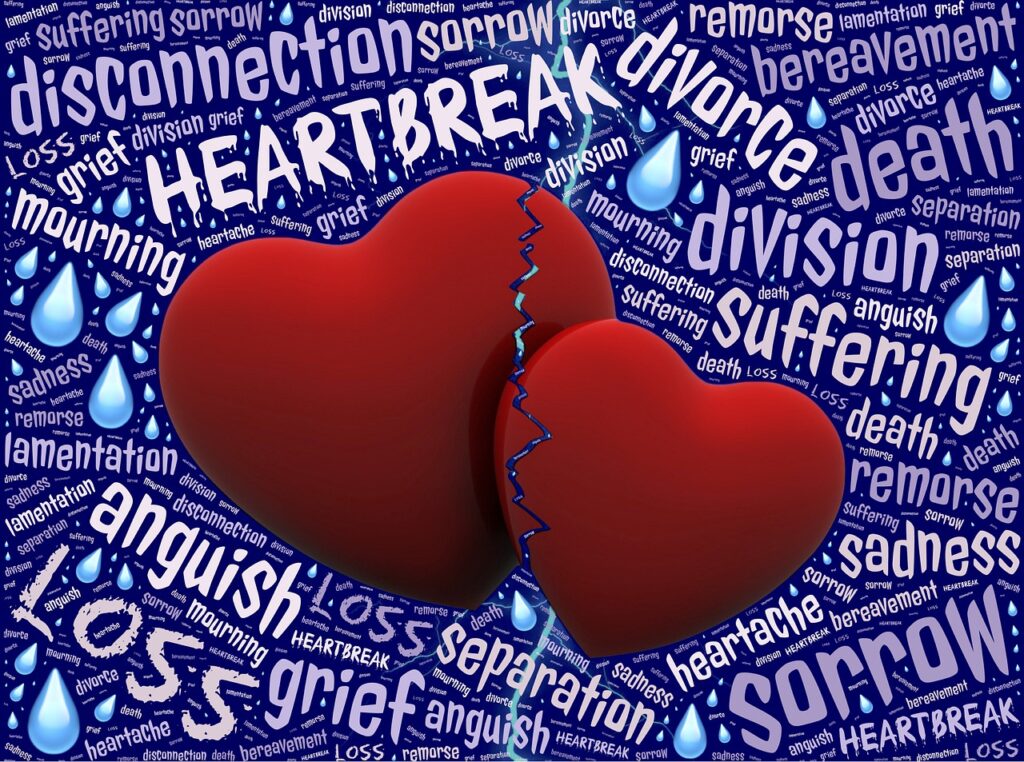
Losing a loved one is akin to standing on the precipice of an abyss, gazing into a darkness that seems to stretch infinitely. It’s an experience that shatters the familiar contours of our lives, leaving us grappling with an indescribable pain that words often fail to capture. Yet, within the depths of this grief lies a transformative journey—one that, against all odds, leads to personal development, resilience, and, ultimately, a profound understanding of the human spirit.
The pain of bereavement is a heavy cloak that wraps itself around us, threatening to suffocate the very essence of who we are. It’s an indescribable ache that reverberates through the core of our being. And yet, as counterintuitive as it may seem, it’s within these depths of sorrow that the seeds of personal development are sown.
I am not an expert or a sage but I am someone who has traversed this difficult terrain. You can read my personal path here. In the wake of losing someone dear, I discovered that grief is not solely a journey of mourning; it is an odyssey through which we can unearth strength, resilience, and a redefined sense of self. Today, I want to extend my hand to you and share details of my own journey, hoping that my experiences may serve as a lantern in the darkness of your own grief—a guiding light that illuminates the path towards healing and personal growth.
Grief is a universal language, and in sharing our stories, we find solace in the common threads that weave through the human experience. My intention is not to provide answers or remedies but to offer companionship. In the midst of this emotional storm, my hope is that you’ll find resonance in the shared emotions, recognising that you are not alone in this journey.
Together, let us embark on a conversation about the transformative potential that grief holds. While the pain may be inevitable, so too is the possibility of emerging from the shadows with a newfound understanding of ourselves, our capacity for growth, and the enduring power of the human spirit.

Understanding Grief:
The first step in personal development after bereavement is understanding grief itself. The well-known stages of grief—denial, anger, bargaining, depression, and acceptance—provide a framework, but it’s essential to recognise that everyone experiences grief differently. It’s a complex and individualised journey. It is about understanding and finding healthier ways to cope with what you are going through.
One of the fundamental truths about grief is that there is no right or wrong way to grieve. Each person’s relationship with the departed and their unique life circumstances shape the grieving process. While some may openly express their emotions, others might find solace in solitude. Some individuals may experience intense sorrow, while others might navigate grief through seemingly detached pragmatism. Understanding that these diverse responses are valid allows individuals to embrace their own grieving process without judgment.
Individualised Responses
Grief is inherently individualised, influenced by factors such as the nature of the relationship with the deceased, the circumstances of the loss, and one’s own coping mechanisms. For example, a sudden loss may elicit shock and disbelief, prolonging the stage of denial, while a prolonged illness might lead to anticipatory grief, prompting individuals to grapple with the impending loss before it occurs.
The Fluidity of Grief
Grief is not a static state but a dynamic and fluid experience. It evolves over time, sometimes resurfacing unexpectedly even after years have passed. Understanding this fluidity helps individuals navigate the unpredictable waves of emotion that may characterise the grieving process. What may initially feel like acceptance can be followed by moments of renewed anger or deep sadness, signifying the ongoing nature of healing.
External Influences on Grief:
External factors, such as cultural background, societal expectations, and individual resilience, also play a significant role in shaping the grieving process. Cultural norms may dictate specific rituals or mourning periods, while societal expectations may unintentionally pressure individuals to expedite their healing. Recognising and navigating these external influences is an integral part of understanding and embracing the unique journey of grief.
Supporting Others in Their Grief
Acknowledging the individualised nature of grief extends beyond personal self-awareness; it also lays the foundation for supporting others on their journey. Friends, family, and communities can offer meaningful support by recognising and respecting the diverse ways in which individuals cope with loss. Creating a space where individuals feel validated in their unique grieving process fosters an environment of empathy and understanding.

EMBRACING EMOTIONS
Grief is an emotional journey marked by profound sorrow, and navigating the depths of these emotions is an integral part of personal development after bereavement. It’s a common inclination to resist or suppress these intense feelings, perhaps under the misconception that displaying vulnerability is a sign of weakness. However, the truth is quite the opposite—allowing oneself to feel the full spectrum of emotions that accompany grief is not only courageous but is also a fundamental step toward healing.
In the face of loss, it’s not uncommon for individuals to be tempted to suppress their emotions. This may stem from societal expectations, a desire to appear strong for others, or simply an attempt to shield oneself from the overwhelming intensity of grief. However, suppressing these emotions often leads to an emotional backlog, a reservoir of unexpressed feelings that can manifest in unexpected and potentially harmful ways.
Acknowledging and expressing emotions, whether it’s the fiery flames of anger, the relentless waves of sadness, or the disorienting fog of confusion, is a vital step in the healing process. This acknowledgment is not an admission of defeat or a surrender to despair but rather a courageous confrontation with the reality of loss. By giving oneself permission to experience these emotions, individuals embark on a journey of self-discovery and healing.
Expressing emotions is, in essence, a courageous act of self-care. It involves acknowledging one’s own needs and allowing the healing process to unfold naturally. This might include engaging in activities that bring comfort, creating art as a form of expression, or finding solace in nature. The goal is not to eradicate the pain but to navigate it consciously, learning from it, and gradually integrating it into the fabric of one’s life.
Vulnerability, often misconstrued as fragility, holds transformative power. It opens the door to authentic connections with oneself and others. In the context of grief, being vulnerable means allowing the heartache to surface, sharing it with those who care, and ultimately, transforming pain into a catalyst for growth and resilience.

REFLECTING ON LOSS
Reflection is a profound act of self-discovery, providing a space for introspection that becomes instrumental in the healing process. To reflect on loss is to embark on a journey inward, exploring the landscape of memories and emotions left behind by a loved one.
Finding outlets for expression becomes a vital aspect of this reflective journey. Whether through the rhythmic strokes of a paintbrush, the fluidity of written words in a journal, or the serene silence of meditation, individuals create sanctuaries for their thoughts and feelings. In these creative expressions, grief finds a voice, allowing the unsaid to be acknowledged and the unexpressed to be heard.
Reflection is not only a means of coping with loss but also a way to honour the memories of those who have departed. It is a deliberate act of remembrance, a tribute to the impact they had on our lives. Through reflection, individuals navigate the terrain of grief, transforming pain into a tapestry of cherished memories that, while bittersweet, serve as a testament to the enduring love and connection shared with the departed.
In the quiet moments of reflection, healing unfurls its wings. It is not about forgetting but about understanding, not about moving on but about integrating the past into the present. Reflection becomes a beacon of self-compassion, guiding individuals through the labyrinth of grief toward a place where the ache of loss is met with a gentle understanding, and the memories become a source of strength rather than sorrow.
Setting Realistic Expectations
Navigating the aftermath of bereavement demands a delicate acknowledgment: healing is a gradual, non-linear process. Setting realistic expectations becomes a compass in this uncharted territory, where grief unfolds at its own pace. There’s no universal timeline, and comparing one’s journey to others can hinder rather than aid. Personal development in the wake of loss involves embracing the uncertainty, understanding that healing takes time, and realising that answers may not manifest immediately. It’s a journey of patience and self-discovery.
Self-Compassion and Self-Care
In the shadows of grief, self-compassion emerges as a guiding light. This cornerstone of personal development beckons individuals to be gentle with themselves. Practicing self-care becomes not just a luxury but a lifeline. From nourishing the body with a healthy diet to embracing restful sleep, these simple acts are profound affirmations of self-worth. Recognising personal needs and prioritising self-care are not selfish endeavours; they are essential components of the healing journey. In the tapestry of grief, self-compassion and self-care are threads that weave resilience, fostering a sanctuary where healing and self-discovery intertwine.
Finding Meaning and Purpose
In the midst of grief’s formidable waves, there exists a transformative opportunity: finding meaning and purpose. This isn’t a quest to erase or replace the profound loss but a journey of discovering ways to honour the memory of a departed loved one. For many, grief becomes a catalyst for positive change — a conduit for advocacy, volunteer work, or creative expression. These outlets not only create a sense of purpose from the pain but also serve as poignant tributes to the enduring impact of those we have lost.
Building a Support System
The weight of grief is not meant to be carried alone. Building a robust support system stands as a cornerstone in the edifice of personal development after bereavement. Encircling oneself with understanding friends, family, or actively participating in grief support groups forms a protective network. In this community, shared experiences foster a sense of belonging and comfort, providing solace during the most challenging moments. Through mutual understanding, individuals navigating grief find strength and resilience.
Rediscovering Joy
Rediscovering joy amidst grief is not a betrayal of the love one holds for the departed. Instead, it’s a courageous acknowledgment that happiness can coexist with sorrow. Allowing oneself to experience moments of joy without guilt becomes a powerful facet of the healing journey. Engaging in activities that once brought happiness or exploring new passions becomes a way to rekindle the spark of life, affirming that healing involves not just coping with loss but embracing life’s continued possibilities.
Professional Help and Resources
Seeking professional help is an emblem of strength, dispelling the misconception that vulnerability is synonymous with weakness. Therapists, grief counsellors, and mental health resources offer tailored support for personal development after bereavement. These professionals provide coping strategies, guidance, and a safe space to explore the complex tapestry of emotions. Their expertise becomes a guiding light, illuminating the path toward healing and self-discovery, emphasizing that reaching out for help is an empowered step in the journey of personal development after loss.

Embarking on personal development after bereavement is an intricate and ongoing journey, akin to navigating uncharted waters where the currents of self-discovery, healing, and growth interweave. In the mosaic of grief, it’s imperative to recognise that there exists no universal handbook, no right or wrong way to grieve. The journey is uniquely personal.
Patience emerges as a guiding virtue on this transformative path. The healing process unfolds gradually, respecting its own rhythm and timeline. There’s no predetermined pace; instead, it’s a journey marked by peaks and valleys, an evolution that defies a linear narrative. Personal development in the aftermath of loss involves accepting the ebb and flow of emotions, acknowledging that healing takes time, and embracing the ambiguity that accompanies grief.
Compassion, both for oneself and others, becomes a tender companion in this expedition. The recognition that each person’s journey is a singular narrative, shaped by the contours of their relationship with the departed, allows for a gentle understanding of diverse grieving processes. It is a reminder that in the vast spectrum of grief, there is room for every emotion, every response, and every coping mechanism.
The heart of this transformative journey lies in the openness to possibilities that arise from the crucible of pain. Amidst the sorrow, seeds of resilience are sown, and avenues for self-discovery unfurl. The grief that initially feels like an insurmountable mountain becomes a landscape for growth, providing fertile ground for newfound strengths, insights, and a deeper understanding of oneself.
May this journey be one not just of survival but of thriving — of turning adversity into an opportunity for profound self-discovery. Resilience becomes the bedrock upon which individuals rebuild their lives, carrying the memories of their loved ones like cherished treasures rather than burdens. As the seasons of grief transition, may the eventual peace sought be not the absence of pain but the harmonious integration of loss into the tapestry of life — a tapestry adorned with threads of love, memories, and the enduring spirit of those who have left an indelible mark. In the symphony of self-discovery and healing, may the crescendo be a melody of resilience, strength, and eventual peace.
